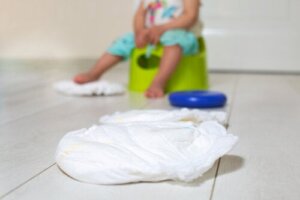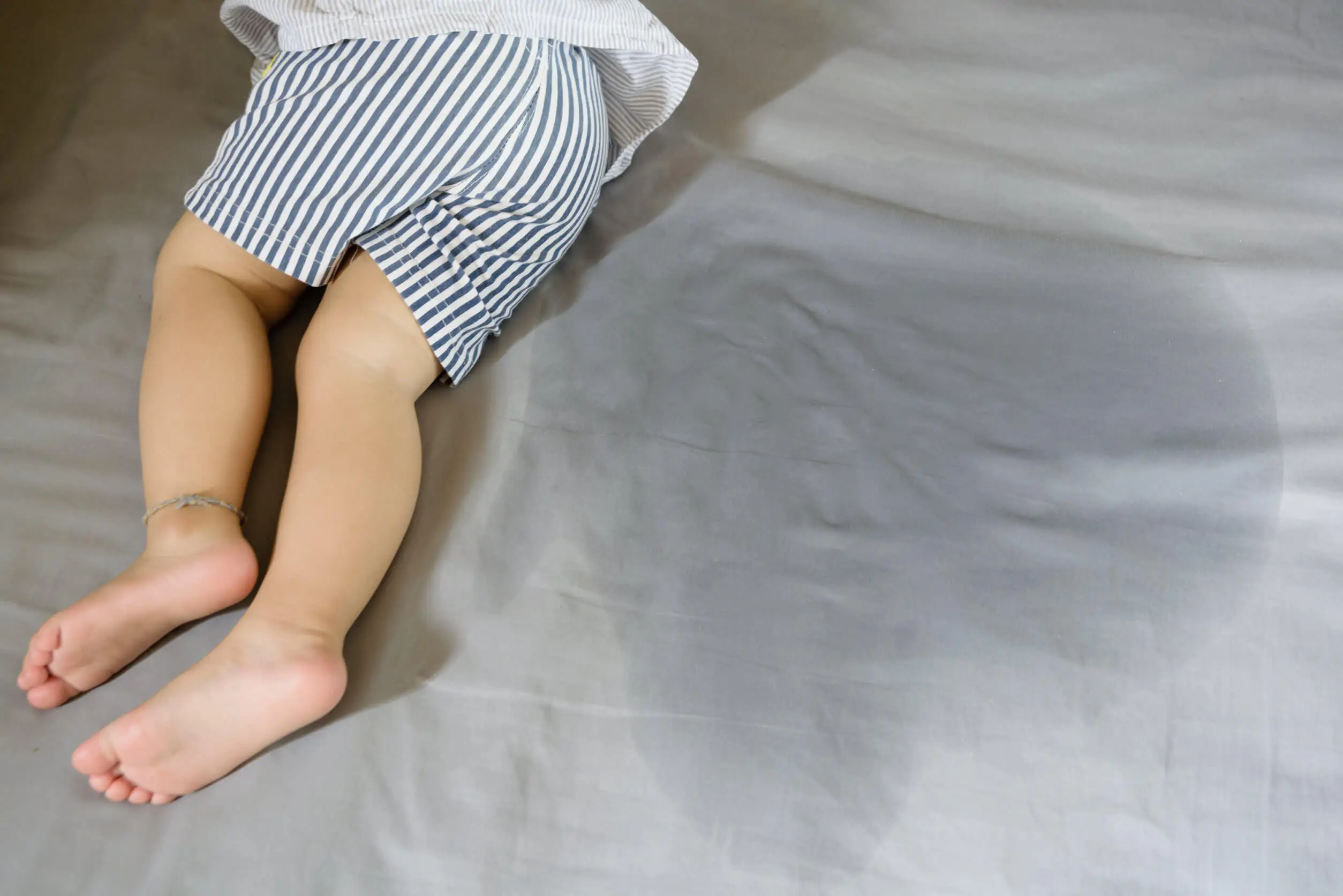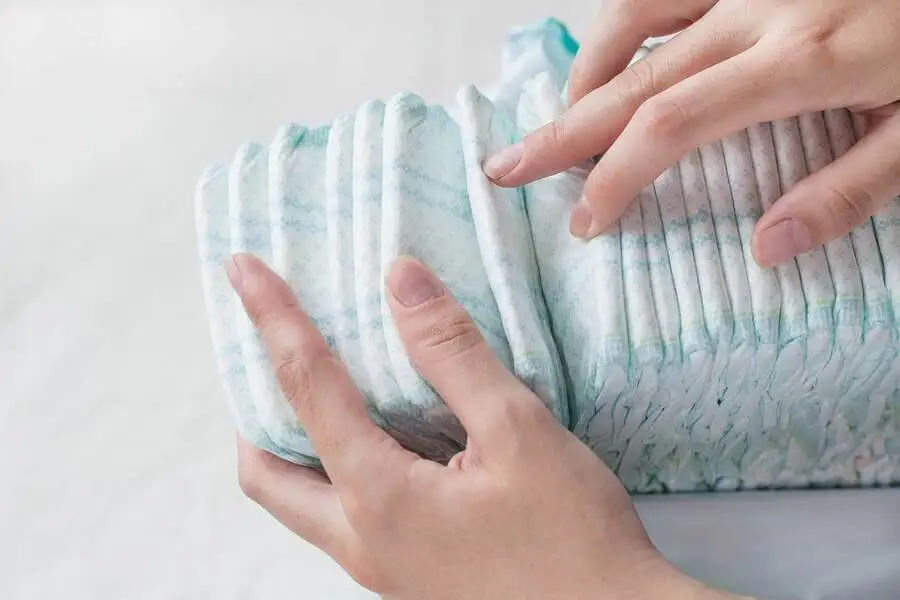When Can Your Child Stop Using Nighttime Diapers?

It’s most common for children to stop using the nighttime diaper some time after they have abandoned a daytime diaper. Sometimes the process occurs simultaneously, but there are no fixed rules.
Each little one has his or her own rhythm.
Some parents may feel impatient when they see that their child is potty trained in the daytime but doesn’t give up his or her nighttime diaper. The truth is that there’s no need to worry.
This is a process associated with the maturation of the nervous system. It shouldn’t be rushed or pressured, but rather encouraged and accompanied until it’s achieved. Patience and understanding are key.
The time to stop using the nighttime diaper
The big question for many parents is when to stop using the nighttime diaper. There’s no exact answer to the question.
It could be said that it’s usual for toddlers to stop using their daytime diapers between 2 and 3 years of age. The nighttime diaper is then commonly abandoned between 3 and 5 years of age. By the age of 3, it’s common for many children to stop using it.
However, it’s estimated that 1 in 4 children are still wetting the bed at night at the age of 4. If bladder control has not been achieved by age 5, it’s advisable to consult a specialist.
Despite this, experts agree that it’s normal to have occasional urine leakage up to 7 years of age. In fact, more than age, what is indicated is to take into account three signs that suggest that it’s possible to try to eliminate the nighttime diaper:
- The child wakes up with a dry diaper for a continuous week.
- He or she wakes up alone at night with the urge to urinate.
- The child asks to have the diaper removed.

Keys to removing a child’s nighttime diaper
The most important thing is that the child feels confident and motivated to stop using the nighttime diaper. It’s necessary to provide psychological and narrative support. That is, you have to explain to him or her how comfortable it is to sleep without a diaper and celebrate when he or she wakes up dry. In this way, he or she will feel supported. It’s essential to involve the child in the decision to stop wearing a diaper at night.
The following tips are worth considering to support the process:
- Congratulate him/her for the progress he/she makes.
- Make sure they wear pajamas that are easy to pull up and down.
- Make sure there are no obstacles on the way to the bathroom.
- Avoid drinking large amounts of liquids two hours before bedtime.
- If the child wakes up for another reason, take the opportunity to take him/her to the bathroom.
- Leave a portable light near the bed. This way he/she can use it when he/she wants to go to the bathroom.
- Encourage the child to tell you when he/she wants to go to the bathroom, even if he/she still wears a diaper.
- Create the habit of going to the bathroom before going to bed. Ideally, this should be done after brushing teeth.
- If the child prefers, ask him/her to tell the parents when he/she wants to go to the bathroom after going to bed.
- There are also bedtime stories that can help children feel accompanied during this process.
We think you may also enjoy reading this article: Should You Wake Your Baby to Change Their Diaper?
What to avoid
Pressure is not at all advisable in these cases. Weaning from nighttime diapering is a process that can take some time.
It’s best to be patient and understand that if your child fails to stay dry, it’s because he or she has not yet completed the maturation of his or her nervous system.
After the child is weaned from nighttime diapering, he or she is still very likely to wet the bed a few times. The whole process can take up to a year. A waterproof cover to prevent accidents is a good idea.
It’s also a good idea to have dry pajamas and sheets on hand, just in case. Don’t scold your child or reproach him for any possible leaks. On the contrary, reassure your child that this is normal.
If your child stops using the nighttime diaper, but then wets the bed several times, it’s best to put the diaper back on and try again later. Perhaps it’s not yet time for him or her to take this step.

Respect the rhythms of the child when leaving behind nighttime diapers
It’s necessary to emphasize that each child is different, and therefore shouldn’t be compared with others. The process of leaving the nighttime diaper isn’t easy.
If the child is between 5 and 6 years old and has not been able to control the sphincters at night, it’s advisable to consult a pediatrician. Even if he/she is able to do so, it’s normal to have occasional accidents until the age of 7.
It should be taken into account that some events may cause regressions in behavior. The arrival of a sibling, a move, or a major change can lead to a return to bedwetting.
Like this article? You may also like to read: Most Commonly Used Types of Healing Creams and Ointments
A natural process
It’s best to try to stop diapering at night during the summer. In this season, the child will feel more comfortable going to bed with fewer clothes. In addition, if he or she wets himself, he or she won’t be exposed to the cold of the sheets.
Parents should take this process very naturally. Stopping using a nighttime diaper is a milestone that will take place when the child’s brain is ready for it.
All cited sources were thoroughly reviewed by our team to ensure their quality, reliability, currency, and validity. The bibliography of this article was considered reliable and of academic or scientific accuracy.
- Díaz, E. T., Suárez, V. M., Alcántara-Canabal, L., Castañón, C. S., & Muíños, C. C. (2021, August). Valoración de los criterios diagnósticos de la enuresis nocturna. In Anales de Pediatría (Vol. 95, No. 2, pp. 101-107). Elsevier Doyma.
- HERRARA, R. S., NAVARRO, J. R., & FERNÁNDEZ, G. P. Enuresis nocturna primaria. Seguimiento en una consulta de Pediatría de Atención Primaria.
This text is provided for informational purposes only and does not replace consultation with a professional. If in doubt, consult your specialist.








